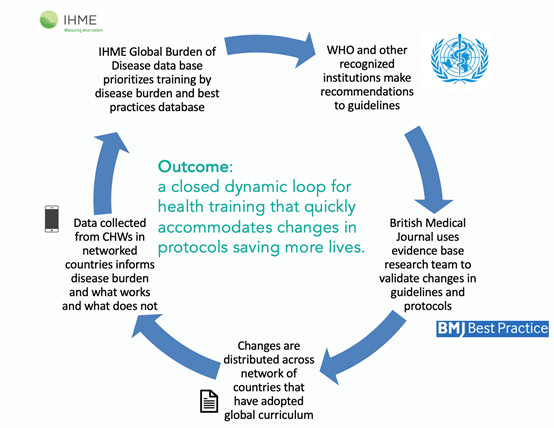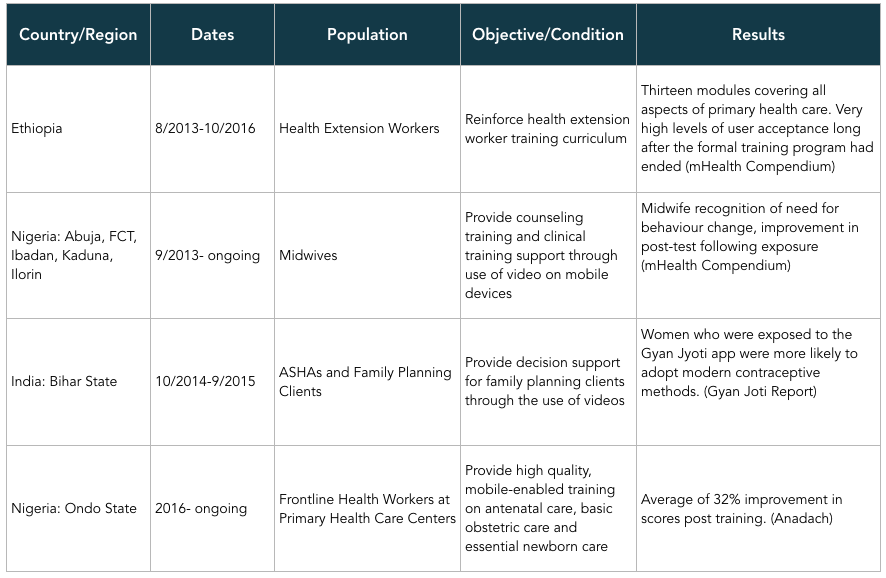By: Michael Bailey, Magnus Conteh, Siobhan Kelley, and Dr. Chomba Sinyangwe
This article was originally published on CHW Central
Background and Rationale
Studies show that trained, high-performing, community health workers (CHWs) can save more than three million lives annually, when integrated into the primary health care system [1]. Unfortunately, many community health worker programs are plagued by ineffective and expensive training and support, making them difficult to implement at scale.
Last Mile Health, an organization that has worked for more than a decade to support governments to build national community health systems, believes that digital technology holds the potential to transform how CHWs and health systems leaders are trained. To expand digital training, Last Mile Health created the Community Health Academy (hereafter the Academy). Founded with the 2017 TED Prize, the Academy partners with Ministries of Health to strengthen the clinical skills of CHWs and the capacity of health systems leaders who support them to build higher-quality systems by leveraging the power of digital training tools.
Purpose and Objectives
Digital technology has offered opportunities to enhance the skill set or provide decision-making support for health workers. The Academy believes that by combining curriculum, multimedia educational content, and the OppiaMobile [2] technology platform into a cohesive system, a country can establish and sustain an ongoing process for delivering high-quality content to health workers that can advance the provision of quality care on a global scale. This will involve establishing:
- A multimedia and content development consortium to incorporate standard global multimedia content that can be customized for different local contexts.
- A development community to support the learning management platform known as OppiaMobile as a global public good.
- Partnerships with government ministries and global organizations concerned with the development of a globally representative and locally adaptable community healthcare curriculum.
Once these objectives are achieved, a global curriculum with embedded multimedia content that is designed for rapid contextual adaptation can be delivered in digital form to CHWs via their mobile devices. This approach allows each country to assume ownership by providing access to a networked library of educational resources, a learning management platform, and a process to customize the content according to their local context and disease burden. Through the creation of a dynamic process that leverages the common elements of the health worker curriculum, embeds adaptable multimedia, is periodically updated to reflect new guidance from WHO, is validated by British Medical Journal’s Best Practices database, and is recalibrated to reflect a country’s disease burden, a sustainable and digitally based content delivery system for CHW training is achievable.

Figure 1: OppiaMobile represents the technological dimension of this dynamic process for providing a digitally based content delivery system for health worker training
The OppiaMobile platform integrates existing, open-source technologies into a single end-to-end content delivery process. These technologies include: a library for storing, validating, and sharing mobile training content; Moodle, the most popular open-source learning management system for course creation; and an open-source mobile app for delivery of course and community content to any Android-based device that can present materials and collect user data while running entirely offline, which is critical to ensure equitable services across the country. Content can be preloaded onto the application and accessed by a CHW without cellular connectivity, thus avoiding the need for negotiated agreements or user fees associated with mobile network operators.
Development
The Academy is using OppiaMobile to deliver the CHW training curriculum in Liberia and is in the process of exploring opportunities to further leverage this technology in Ethiopia and Uganda. Digital Campus and their partners developed and tested the OppiaMobile platform over eight years with deployments in Ethiopia, Nigeria, Pakistan, India, Uganda, Ghana, Lebanon and Liberia (where nearly two-thirds of community health workers are now using the tool for training and education). Although OppiaMobile can be used right away with content based on Ethiopia’s Health Extension Worker (HEW) curriculum, the reality is each country will want to adapt their own curriculum for use. To leverage the commonality of the health worker curriculum and the use of digital technology, the Academy is advocating for each country to adapt the global curriculum for local use. The Academy will support deployment of the technology and the adaptation of the global curriculum for each country will involve a phased approach: first, a design workshop involving key stakeholders from government and other health related organizations meet to agree upon roles and responsibilities and develop a workplan; second, local and international experts work together to adapt the curriculum, embed relevant multimedia, and assume ownership of the technology; third, targeted deployments are conducted where local and international experts work with a representative sample of health workers to ensure user needs are met and that the content resonates with the learner. Once validated for large scale deployment, the Academy and its partners work with ministry officials work to institutionalize the technology and the underlying process of content development, validation and evaluation.
Audience
Community Health Workers from all over the world, whether in orientation workshops or working in their communities have expressed gratitude for providing a tool that makes their jobs easier to manage. Ministry officials responsible for ensuring that community health workers are adequately trained to do their jobs have expressed support for institutionalization of the platform. Universities, such as Makerere in Uganda, have adopted the platform to support University initiatives and national programs. Although anyone can download and operate the technology, it is advised to coordinate any effort involving government health workers with appropriate authorities in that country. While initially developed to support community health workers, the platform is content agnostic. The technologies can be used for any type of training content. Almost all implementations so far have been for primary healthcare, though the platform has also been used for primary/secondary school education for Syrian refugee children in Lebanon and for agriculture workers in Niger.
Usability
The learner, in this case a CHW, should be familiar with the use of a smart phone in order to navigate the Android-based application (i.e. access content, run videos and answer quizzes). The supervisor or decision-maker concerned with a CHW program needs to be familiar with the Android-based application as well as the analytics that are collected from each user’s mobile device and are periodically uploaded into the server. Visualizations of CHW usage and knowledge of the content are presented as charts and tables allowing decision-makers to consider the effectiveness of the content.
For Ministries of Health or other partners interested in adapting the mobile trainings, guidance on the technologies that underpin the digital training tools can be found through the following links:
The technology allows for rapid incorporation of translated content from any language. Content has been adopted for use in English, Spanish, French, Urdu, Hindi and (Lebanese) Arabic. Since the platform is content agnostic, the course content can be developed in any language that is required for the target user group. We would welcome any new translations of the main user interface – new languages can be added by individuals, even if they are not technical developers or programmers.
Results/Lessons Learned
Past pilot and demonstration deployments of the OppiaMobile platform and some of the results of these efforts are outlined in Table 1.
Table 1: Past Pilot and Demonstration Deployments of the OppiaMobile platform
Hosted by Last Mile Health, the Academy will leverage the potential of digital technology to contribute to the training of hundreds of thousands of community health workers and the leaders who support them. Working across sub-Saharan Africa, South Asia and the Americas, the mission of the Academy is to collaborate with national governments and international institutions to transform the lives and health outcomes of millions of people.
To achieve these goals, the Academy is developing a Continuing Clinical Education (CCE) program for CHWs. The CCE program will work with governments and local resources to establish local capacity and a process for developing multimedia educational content (supported by a global network with technological and educational expertise) that can be combined with face-to-face training for a complete blended learning approach. This approach is intended to reinforce—not replace—existing training (in-person and digital) programs.
In service of this mission, the Academy is partnering with a number of countries to deploy the OppiaMobile platform to advance CCE:
- Liberia: Deployment of the Android-based application to over 2,300 community health workers in Liberia is ongoing, with a target to include all 4,000 of the cadre.
- Uganda: Agreements with Makerere University and ongoing negotiations with the Ugandan Health Ministry have established OppiaMobile (known as Open Deliver in Uganda) as the primary platform for distributing digital educational content to CHWs.
- Ethiopia: Signed agreement with the Ministry of Health to work with them to deploy the technology for pre-service and in-service training of their roughly 38,000 Health Extension Workers (HEWs).
References
- Chou, V. B., Friberg, I. K., Christian, M., Walker, N., & Perry, H. B. (2017). Expanding the population coverage of evidence-based interventions with community health workers to save the lives of mothers and children: An analysis of potential global impact using the Lives Saved Tool (LiST). Journal of Global Health, 7(2), 020401. doi:10.7189/jogh.07.020401
- OppiaMobile is developed by Digital Campus as an open source digital platform for mobile learning and education. Although the OppiaMobile platform has been used to deliver digital educational content for several years in small scale implementations, the Community Health Academy’s use of the technologies provides an opportunity for it to be used at scale.





